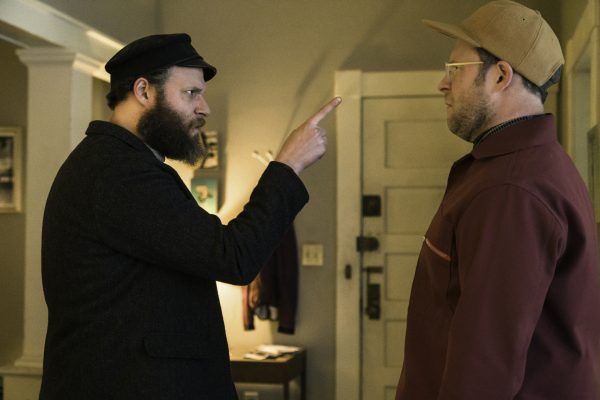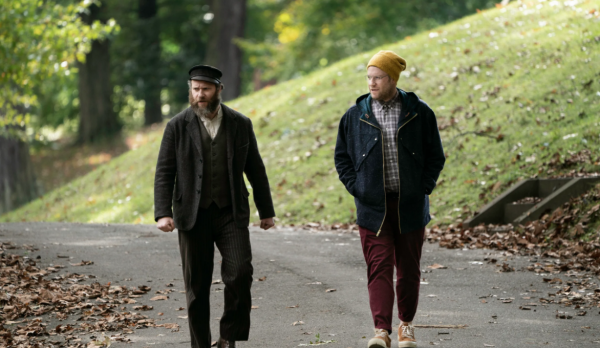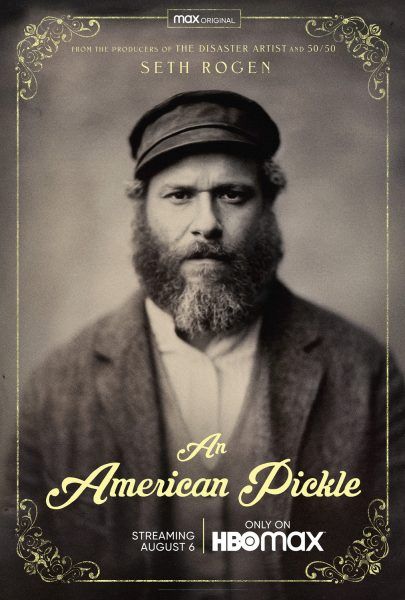Lately, I’ve been talking to my parents about our family ancestry. As the pandemic ravages our country and death looms large in the public imagination, I’ve looked for refuge in the past by trying to bring the story of my ancestors to life. As the descendant of Jewish immigrants from Eastern Europe on both sides of my family, I should have connected with Brandon Trost’s new movie An American Pickle. The story of a modern man coming face-to-face with his Jewish ancestor has a lot of potential, but sadly Simon Rich’s script only realizes that potential in fits and spurts. The film never manages the balance between melancholy meditation on legacy, family, and grief and broad, farcical depictions of a fish-out-of-water, so An American Pickle lacks the focus to be hilarious or emotional. Instead, it’s a frustrating, ramshackle affair that sporadically reaches its potential.
In 1919 in a small Eastern European village, Herschel Greenbaum (Seth Rogen) dreams of a marginally better life than being a ditch digger. With his wife Sarah (Sarah Snook), they make their way to America where Herschel gets a job killing rats at a pickle factory. One day, he falls into a tub of brine, which is then immediately sealed, no one goes looking for him, and 100 years pass before he’s discovered alive and perfectly preserved. His only living relative is his great grandson, Ben (also Rogen), who works as a freelance app developer in Brooklyn. While Herschel is at first astonished by the abundance and comforts of modern life, he quickly bristles at Ben’s lack of ambition, especially when he discovers that Sarah’s gravesite is overshadowed by an ad for vodka. Resolving to take down the billboard and prove his great-grandson a coward, the two become nemeses as Herschel attempts to start his own pickle business.
On his TV series Miracle Workers: Dark Ages, Rich perfectly manages dark, absurdist humor with sweet, emotional moments, but here that mastery escapes him. Rather than feeling like a cohesive story where the dark comedy reinforces the human connections, having Herschel and Ben set up as the central conflict deprives the movie of its emotional core. Their conflict drives the film forward as Ben tries to thwart Herschel only to have the modern world accommodate Herschel in a new way, but it deprives the film of any emotional stakes since there are no relationships outside of Herschel and Ben. At best, you get a scene where an isolated Herschel feels sad or an isolated Ben feels sad, but there’s not much in the way of emotional catharsis.
That lack of an emotional impact is particularly frustrating when you see all the potential the film has to really dig into what it means to be a legacy of an immigrant. The film clearly has immigration on its mind and how we let people in a hundred years ago to build this great nation, but now there’s a political party devoted to keeping out immigrants to “make America great again.” But again, the film’s struggle with specificity rears its head as the immigration debate stays on the backburner and doesn’t really add up to more than “Yeah, our ancestors would probably think we’re weak and weird for how we live now even if we exist in a greater state of comfort than they could ever imagine.” For me, that’s the fascinating conflict—wanting a better life for your descendants but wrestling with how that might make them depart from your beliefs and lifestyle—than how Ben plans to tear down Herschel’s pickle business.
In its best moments, An American Pickle knows how to thread the needle between fish-out-of-water comedy and retaining a thoughtful look at Jewish ancestry in America, but those moments are few and far between. Rogen has said recently that he thinks “religion is silly”, and that’s fine, but for a film that seeks to explore what it means to be a modern Jew in comparison to ancestors who Judaism was deeply important to their lives, An American Pickle kind of shrugs it away under the banner of “family is good.” Every time the movie has a chance to go deeper, whether it’s with immigration or legacy or American comfort or Judaism, An American Pickle skims the surface and moves on.
An American Pickle is far from the worst film I’ll see all year. Trost, a talented cinematographer, has made a handsome movie out of a small-scale comedy, and there are jokes that land. It’s never an unpleasant movie, but it’s one where you frequently see all the ways it could have been much stronger given the story it’s attempting to tell. Perhaps I’m asking too much from a movie where a man gets pickled for 100 years, but the light premise still gives way to stronger themes that An American Pickle never figures out how to grasp.
Rating: C




